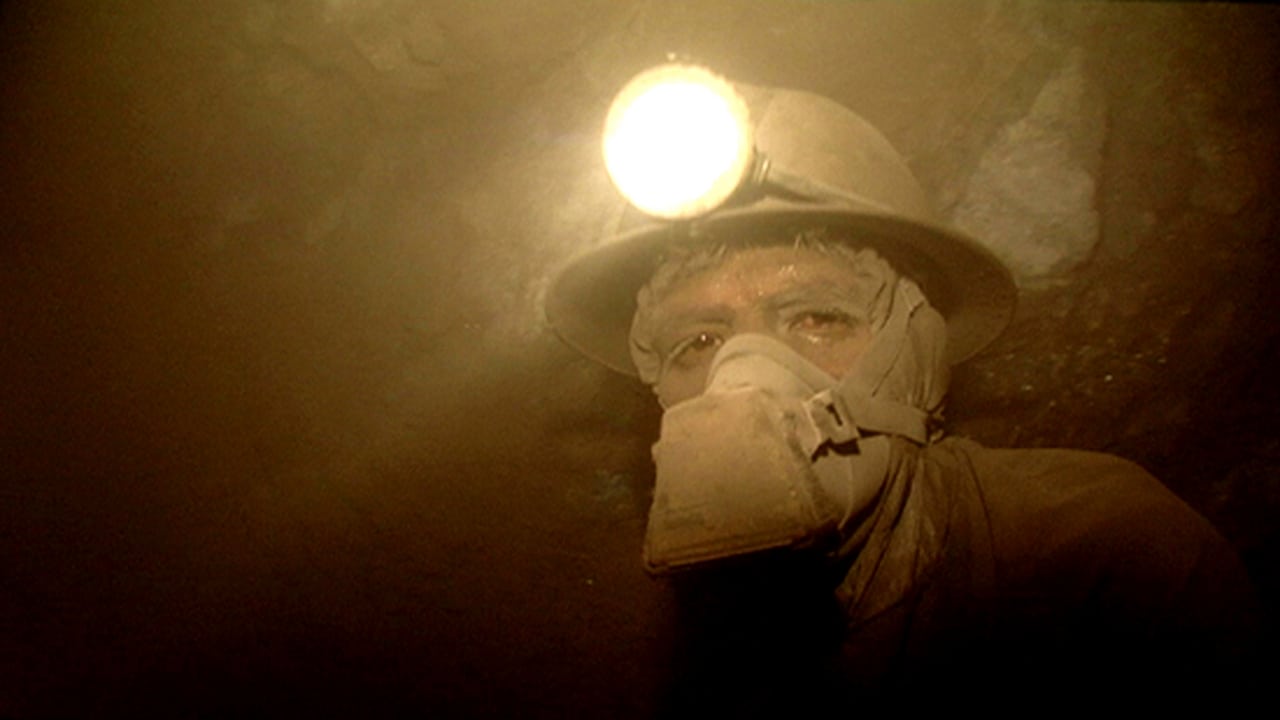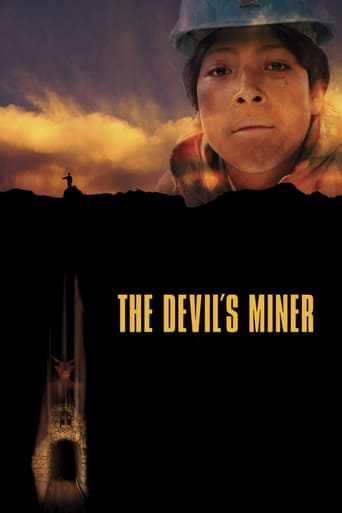Interesteg
What makes it different from others?
AboveDeepBuggy
Some things I liked some I did not.
PlatinumRead
Just so...so bad
MonsterPerfect
Good idea lost in the noise
museumofdave
Basilio is a boy you won't forget; only 14, he works below the Bolivian earth as a miner, working with his younger brother to find what little silver might be left beneath the chilly mud of the long-mined mountain. What dazzled me in this documentary is how filmmakers Davidson and Ladkani disappear, how they create a full picture of a young life in peril, how objectively they allow Basilio to tell his tale; occasionally you're aware of the lush sunsets that contrast with the grey mud the boy tramps through on his way to a long shift in unbelievably risky tunnels; it would be easy to continue to extol this films many virtues; The Devil's Miner is an important film about the need for education in a place where the basic necessities are barely obtainable--it's also about courage and self-determination. The fine documentary is certainly not your usual entertainment, but it's not easily forgotten.
John W Chance
This is an excellently made documentary. The visual quality of the film has a fresh, live look. The beauty of Bolivia is contrasted with a horrifying story being told about the silver mines and miners of the Cerro Rico Mountain in Bolivia, a mountain called, "The Mountain that Eats Men." It is a film about one of the real hells that exists on our planet -- the plight of miners. There are over 5,000 Indios working at one of the 500 miner owned cooperatives on Cerro Rico, which has been mined for over 450 years. It is estimated that over 8 million have died in the mines. Most of the miners die in their forties from silicosis, a debilitating lung disease contracted from inhaling too much dust; others die from explosions, cave-ins and falling rocks.Each mine has its own evil god called a "Tio" (a corruption of the word "Dio") a devil god that must be respected to avoid an early death, and to hopefully help them find more silver. As explained by the miners, the Tio was created by the so-called 'Christian' Conquistadores to quite literally put 'the fear of the devil" into them. It worked. They still worship and give reverence to the Tios.The miners know they will not live very long because of silicosis. One shot shows their graveyard. They know they are sacrificing themselves for their families; they feel proud to be miners, so that they can help their families, and Bolivia! Contrast this with so many young people here in America who gladly sacrifice their families for their own self serving pleasure, and you get an awakening about how mature and heroic the narrator of the film, the 14 year old miner Basilio is.He narrates the movie. You can't help but get really drawn into the film. It's mostly the story of Basilio, his brother Bernardo and their mother. There are many touching scenes with Basilio interacting with others. He talks to miners about Tio, and to Bernardo about their dreams of leaving the mines. He wants to be a teacher, and Bernardo wants to be a civil engineer.However, in order to make more money, he goes to work at a different and more dangerous mine, where the boss sees him as his pick to grow up to be a drilling master. He's actually condemning him to death, since the person who does the pneumatic drilling inhales the most dust and will surely die from silicosis. Condemned in die in blinding dust, dreams of living destroyed.As noted by others above, fortunately, Basilo and his brother were rescued from the mines by the filmmakers, and are now able to live full time normal lives away from the mines.Part of the excellence of the film is that it is in no way judgmental about its subject: it does not have a voice over narration telling us anything, nor any didactic juxtapositioning of images nor Michael Moore trying to get into the offices of presidents of American silver import companies, but rather lets the actual natives of the city of Potosi tell their own story. It does not place blame, but leaves that to us as viewers.This is the way documentaries should be made, practically as tightly edited 'slice of life'. It's also the kind of film we need to see to remind us, that while we sit here in comfort at our computers, we are living off the blood, sweat and toil of the world's masses; standing on the backs of the poor, the exploited and the dead. Check out the Internet for fact articles on miner's lung diseases. You'll be shocked at how many are dying not just in Bolivia or the United States, but also in China.Good documentaries like this one let the story speak for itself. I give it an 8.
kmdanse
This is a truly captivating and personal story of a 14-year old boy struggling for a better life. My family and I watched the film, and we can not believe the treacherous conditions endured by these underage child miners. Basilio Vargas and his younger brother should serve as role models for those of us who have ever complained about a rough life. Much to my surprise, a powerful sense of courage, faith and family exists, and the Bolivian culture speaks volumes on screen. These daring filmmakers have masterfully captured a forgotten world and made it accessible to those of us who will never have to set foot inside of a mine. It is commendable that they risked their own lives to bring us such reality.
andlaw99
Yes, this documentary is about poor, fatherless children who must work in the hazardous mines to support their families. I won't go into a lot of detail about the specifics of the film--you can find that in other user comments. There are multitudes of documentaries detailing the sad stories the less fortunate members of the world are forced to live every day. So what? What makes this movie different? Two things: 1) the incredible maturity and strength of character of Basilio Vargas (the 14 year old miner the documentary is centered around) and 2) the expert way the filmmakers let the story tell itself instead of force-feeding the viewer pity and guilt.I am not a filmmaker, but I think it took a great deal of wisdom for them to realize that this young man could relate the story on his own better than any amount of narration or scripted propaganda. Basilio is heroic, mature, a dreamer with goals and aspirations, a fatherless child, a father to his siblings, a breadwinner for the family, and he never complains about any of it.Watching this film makes you want to comfort Basilio and then get down on your knees and ask God for forgiveness for being such an ungrateful and spoiled Westerner. Somehow though, you come away from it wishing you could show it to everyone you know, and wishing you could tell Basilio how much you admire him.

